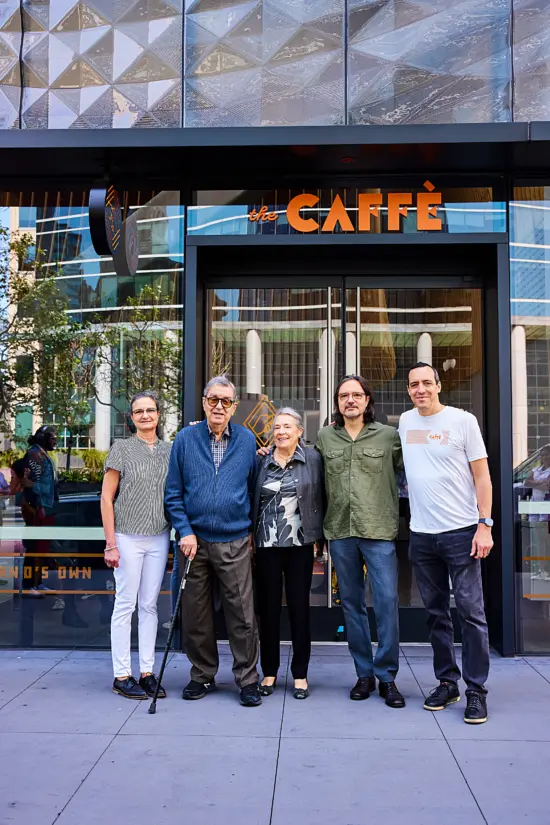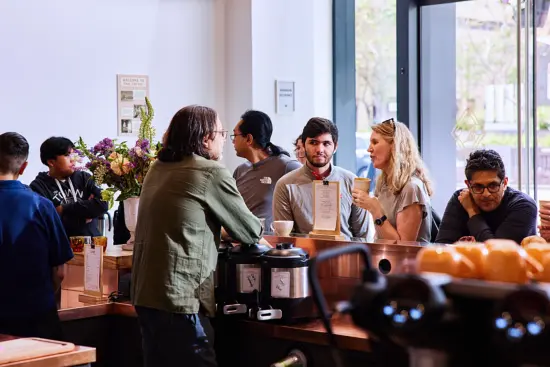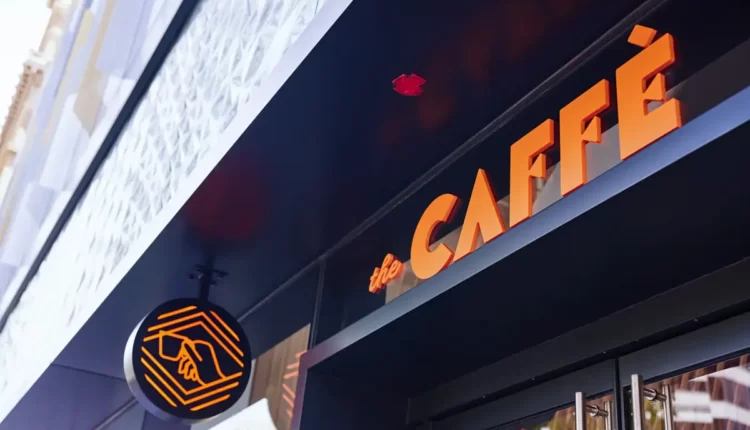Mr. Espresso Opens The Caffé in Downtown Oakland: Part One
Continuing its long tradition of Italian coffee in Oakland, Calif., the famous brand Mr. Espresso has opened a cafe in the city’s downtown area.
BY EDDIE P. GOMEZ
SPECIAL TO BARISTA MAGAZINE
Photos by Hardy Wilson except where noted
Few stories in specialty coffee are as inspiring as that of Oakland, Calif.-based Mr. Espresso. The iconic Bay Area brand started modestly 45 years ago in Carlo and Marie-Francoise Di Ruocco’s garage in Alameda. The couple met and married in France after Carlo ventured there from his native Italy during the 1960s. They soon started a family and immigrated to the United States, arriving in the Bay Area with their two eldest children in tow. The Di Ruoccos settled into their new life and added a third child to the family.
Five decades later, the Di Ruoccos’ foundational role in establishing espresso cuisine on the West Coast is legendary. Driven by a reverence for craftsmanship and tradition that embraces the past but looks to the future, Mr. Espresso continues to prosper in an ultra-competitive industry.

Filling the Void
Carlo Di Ruocco stumbled upon a void in California’s food and beverage circles during the 1970s. Noticing the absence of quality espresso options in the Bay Area—beyond those found in the few Italian eateries that owned espresso machines at the time—Carlo gambled on the future of coffee in Northern California. He quit his job in the elevator repair industry in 1978 and went into business for himself. His goal was to bring authentic Italian espresso and wood-fired coffee-roasting traditions to the U.S. He also started supplying Bay Area restaurants and cafés with espresso machines imported directly from Italy, which helped café owners avoid the headache of dealing with customs and faraway business relationships.
Part of Carlo Di Ruocco’s vision centered on wanting Americans to experience the bold taste and sweet finish of the espresso that he was raised on in Salerno, Italy. As a teenager, he apprenticed for two years under a roastmaster specializing in oak wood-roasted coffees. At that time in the United States, according to Carlo, “Very little was known about espresso.”

Bringing Italian Style to Oakland
In the years that followed, Carlo continued leveraging his love of Italian espresso traditions to grow his company. He introduced a legion of Bay Area folks to coffee drinks beyond the commonplace American drip, such as espressos and cappuccinos.
As history would have it, Mr. Espresso did a lot more than just sell high-quality coffee equipment. The company started servicing espresso machines, utilizing Carlo’s mechanical aptitude for working on them. The family also implemented training programs designed to help cafés optimize the quality of their coffees, before taking a giant step in their trajectory.

Venturing into Roasting and the Food Scene
The Di Ruoccos began roasting their own oak wood-fired coffees. Eventually, they settled into an expansive facility at 696 3rd Street in Downtown Oakland, which they have now occupied for over 30 years.
Carlo Di Ruocco’s efforts early on met with success as the practice of finishing a great meal with an espresso caught on in trendy Bay Area restaurants. His inside knowledge of Italian coffee traditions gained the attention of prominent restaurateurs. Notable chefs were revolutionizing menu designs, driven by the principles embodied in food movements such as farm-to-table and California cuisine. Those movements redesigned the way Americans accessed food and beverages and helped to cultivate a budding interest in Italian-style coffee drinks.
Stay tuned for part two of this article, coming soon to Barista Magazine Online.
ABOUT THE AUTHOR
Eddie P. Gomez (he/him) is a freelance writer based in Modesto, Calif. When he is not substitute teaching kindergarten classes, he wanders from city to city, perfecting the art of the food and coffee adventure.

READ THE LATEST BARISTA MAGAZINE
Out now: It’s the June + July 2023 issue of Barista Magazine featuring Martin Shabaya of Kenya on the cover. Read it for free with our digital edition. Get your Barista Magazine delivered; start a subscription today! Visit our online store to renew your subscription or order back issues.
Source: Barista Magazine



